Abstract
Cognitive function was examined in 227 patients three months after admission to hospital for ischaemic stroke, and in 240 stroke-free controls, using 17 scored items that assessed memory, orientation, verbal skills, visuospatial ability, abstract reasoning, and attentional skills. After adjusting for demographic factors with standardised residual scores in all subjects, the fifth percentile was used for controls as the criterion for failure on each item. The mean (SD) number of failed items was 3.4 (3.6) for patients with stroke and 0.8 (1.3) for controls (p < 0.001). Cognitive impairment, defined as failure on any four or more items, occurred in 35.2% of patients with stroke and 3.8% of controls (p < 0.001). Cognitive domains most likely to be defective in stroke compared with control subjects were memory, orientation, language, and attention. Among patients with stroke, cognitive impairment was most frequently associated with major cortical syndromes and with infarctions in the left anterior and posterior cerebral artery territories. Functional impairment was greater with cognitive impairment, and dependent living after discharge either at home or nursing home was more likely (55.0% with, v 32.7% without cognitive impairment, p = 0.001). In a logistic model examining the risks related to dependent living after stroke, cognitive impairment was a significant independent correlate (odds ratio, OR = 2.4), after adjusting for age (OR = 5.2, 80 + v 60-70 years) and physical impairment (OR = 3.7, Barthel index < or = 40 v > 40). It is concluded that cognitive impairment occurs frequently after stroke, commonly involving memory, orientation, language, and attention. The presence of cognitive impairment in patients with strike has important functional consequences, independent of the effects of physical impairment. Studies of stroke outcome and intervention should take into account both cognitive and physical impairments.
Full text
PDF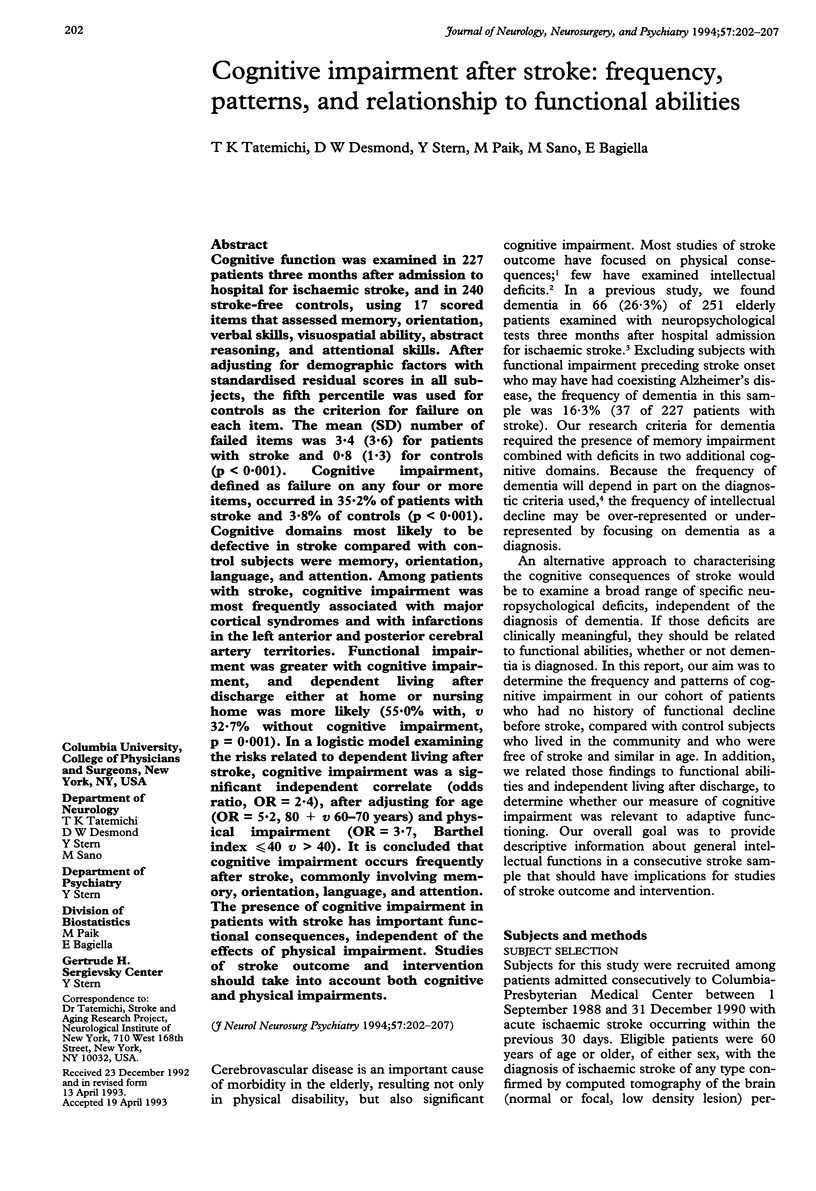
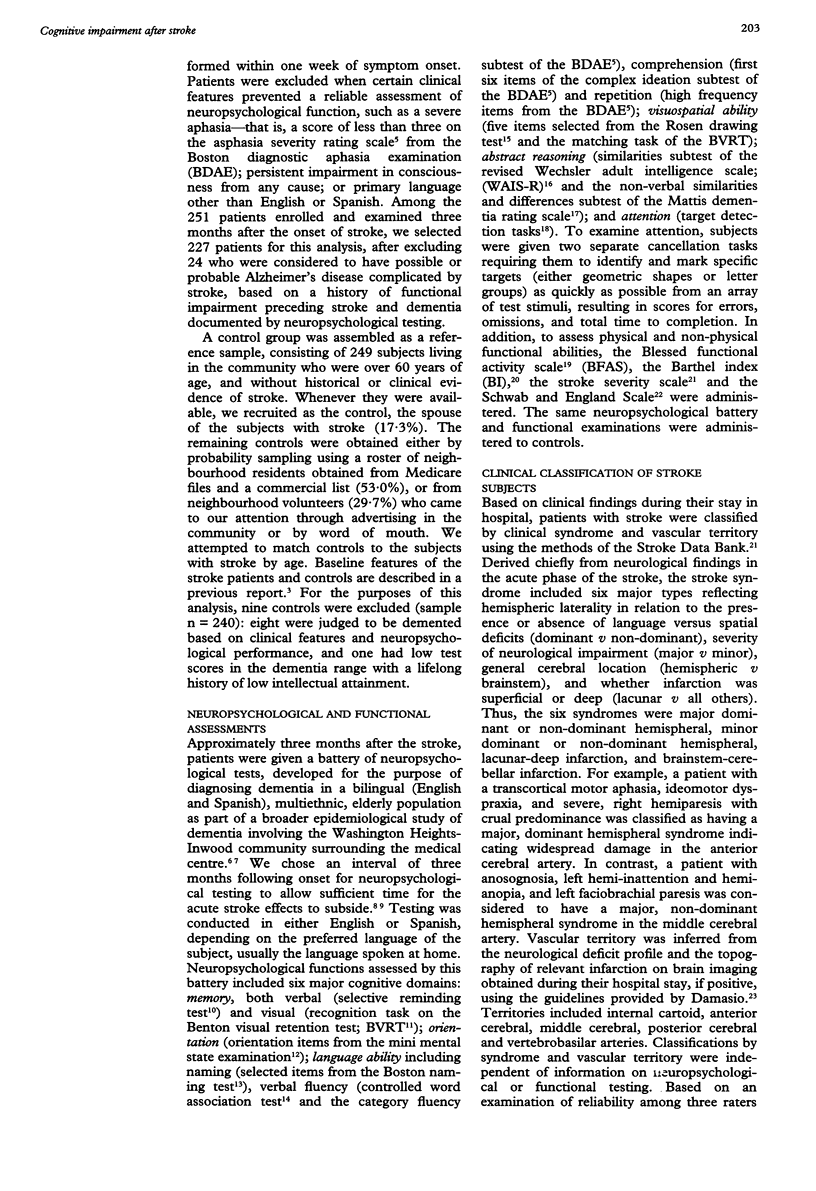
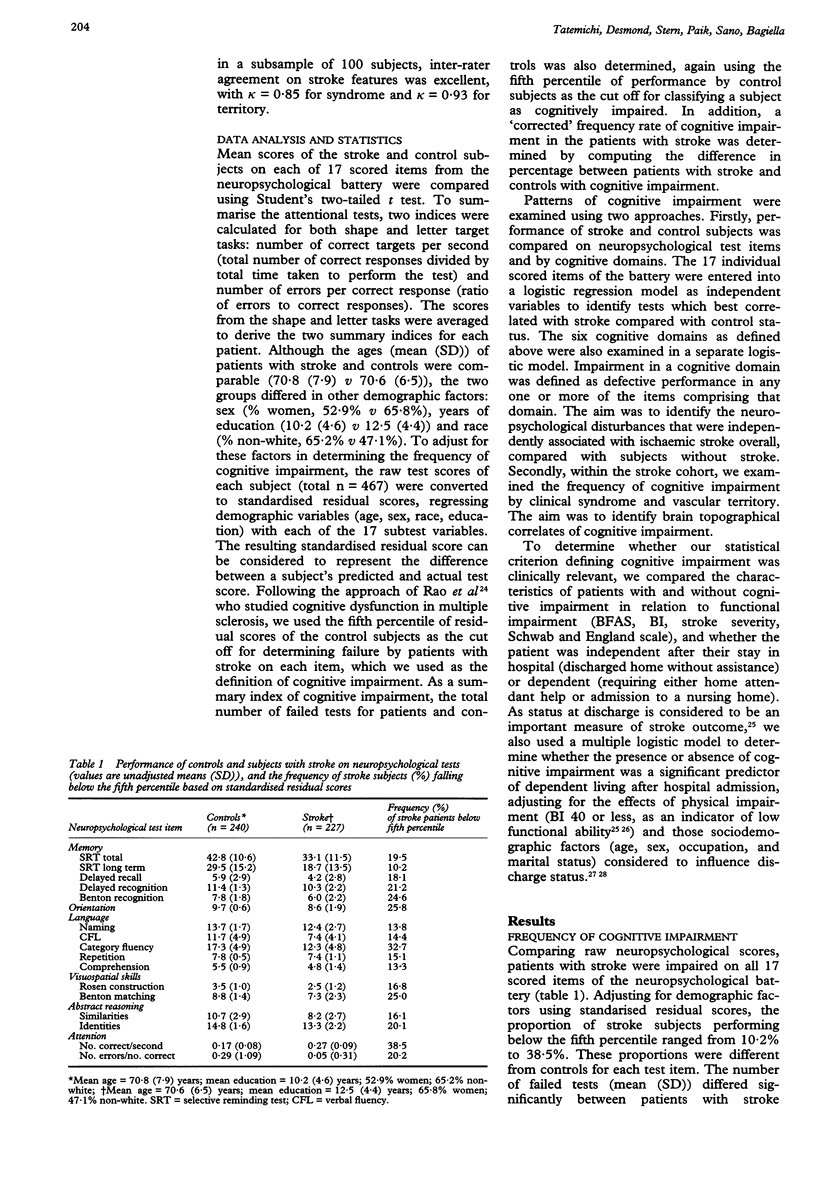
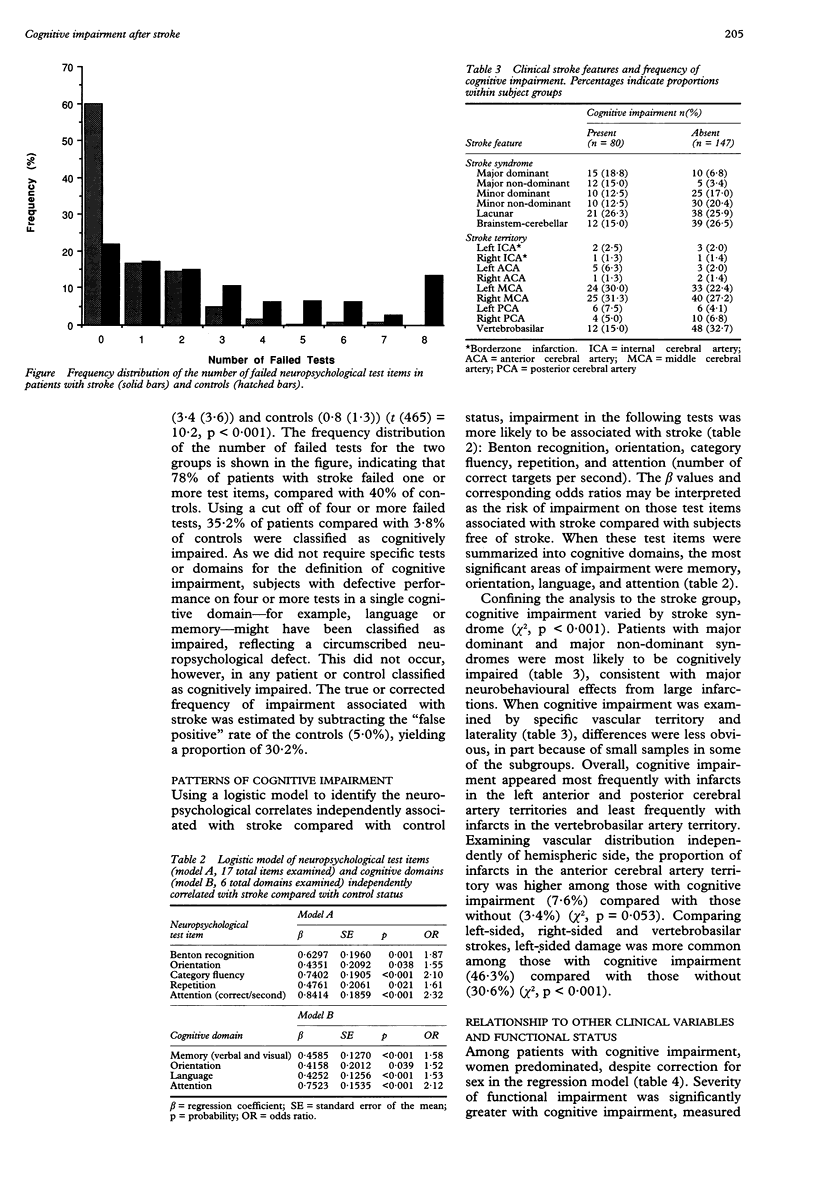
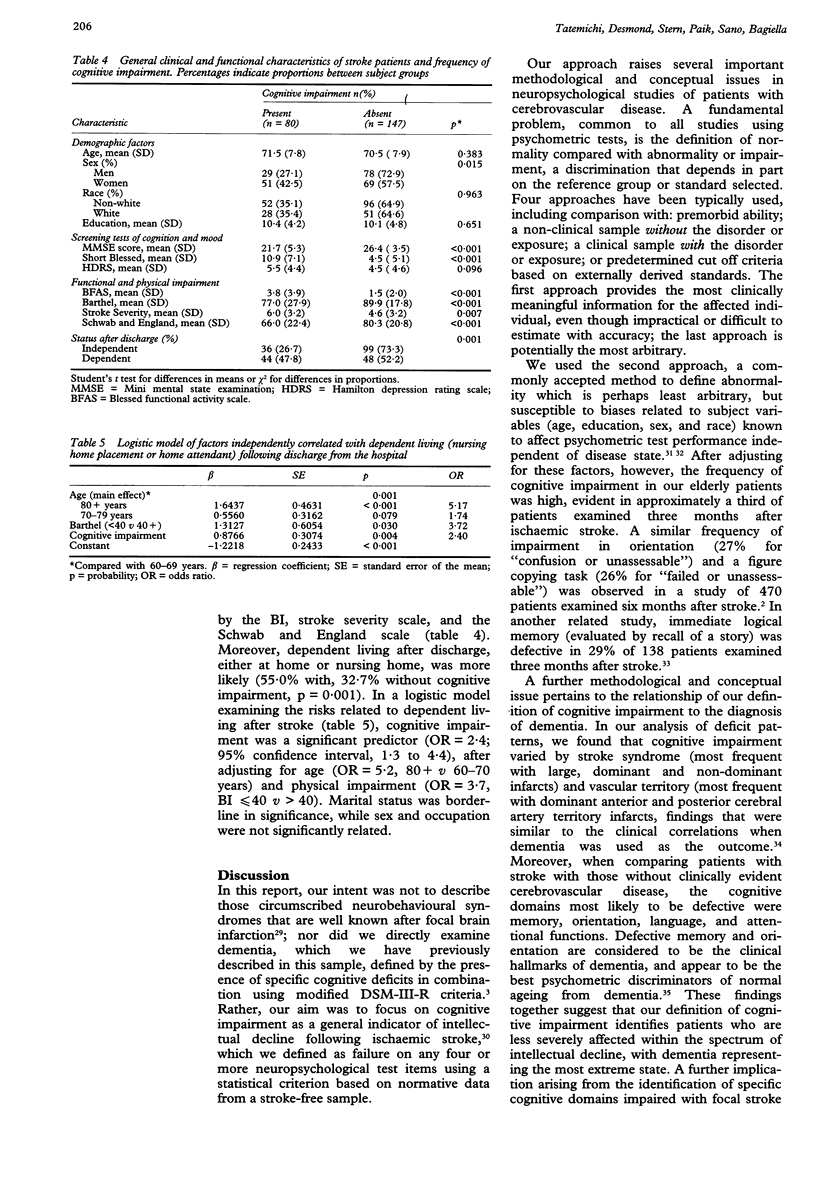
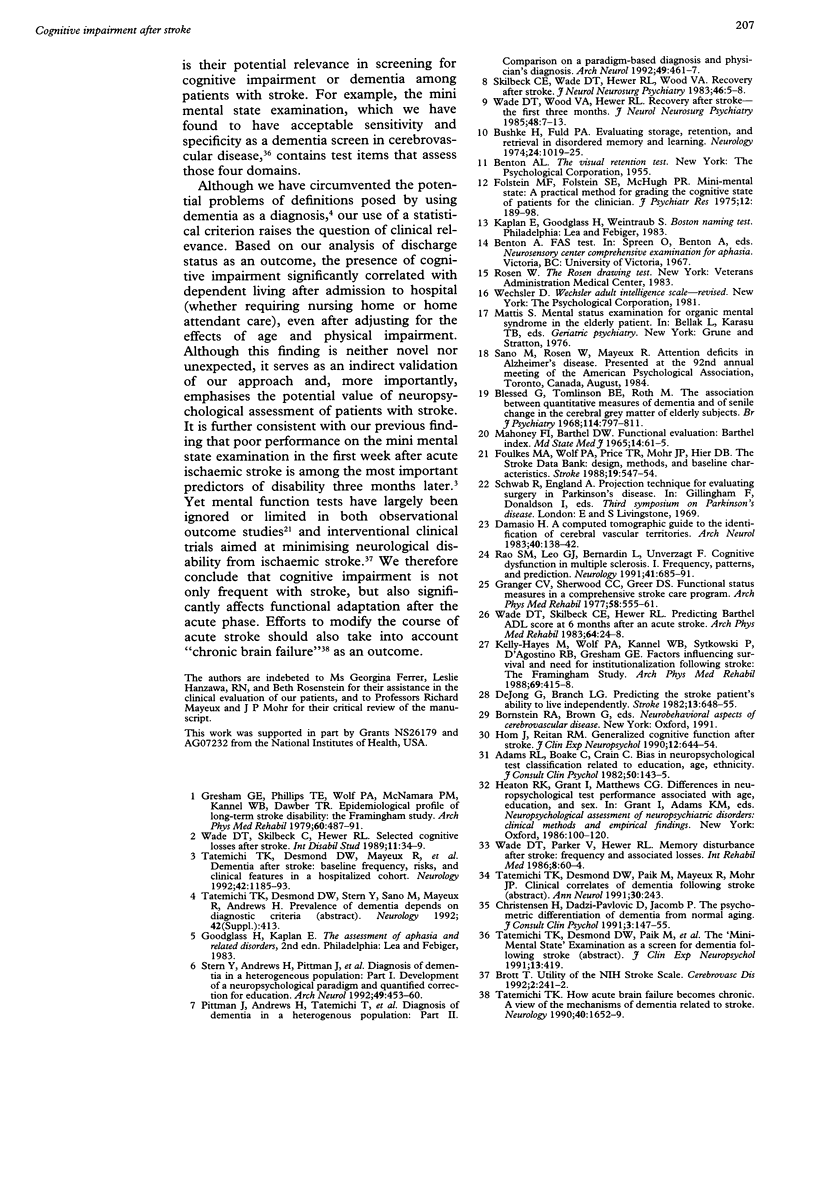
Selected References
These references are in PubMed. This may not be the complete list of references from this article.
- Adams R. L., Boake C., Crain C. Bias in a neuropsychological test classification related to education, age, and ethnicity. J Consult Clin Psychol. 1982 Feb;50(1):143–145. doi: 10.1037//0022-006x.50.1.143. [DOI] [PubMed] [Google Scholar]
- Blessed G., Tomlinson B. E., Roth M. The association between quantitative measures of dementia and of senile change in the cerebral grey matter of elderly subjects. Br J Psychiatry. 1968 Jul;114(512):797–811. doi: 10.1192/bjp.114.512.797. [DOI] [PubMed] [Google Scholar]
- Buschke H., Fuld P. A. Evaluating storage, retention, and retrieval in disordered memory and learning. Neurology. 1974 Nov;24(11):1019–1025. doi: 10.1212/wnl.24.11.1019. [DOI] [PubMed] [Google Scholar]
- Damasio H. A computed tomographic guide to the identification of cerebral vascular territories. Arch Neurol. 1983 Mar;40(3):138–142. doi: 10.1001/archneur.1983.04050030032005. [DOI] [PubMed] [Google Scholar]
- DeJong G., Branch L. G. Predicting the stroke patient's ability to live independently. Stroke. 1982 Sep-Oct;13(5):648–655. doi: 10.1161/01.str.13.5.648. [DOI] [PubMed] [Google Scholar]
- Folstein M. F., Folstein S. E., McHugh P. R. "Mini-mental state". A practical method for grading the cognitive state of patients for the clinician. J Psychiatr Res. 1975 Nov;12(3):189–198. doi: 10.1016/0022-3956(75)90026-6. [DOI] [PubMed] [Google Scholar]
- Foulkes M. A., Wolf P. A., Price T. R., Mohr J. P., Hier D. B. The Stroke Data Bank: design, methods, and baseline characteristics. Stroke. 1988 May;19(5):547–554. doi: 10.1161/01.str.19.5.547. [DOI] [PubMed] [Google Scholar]
- Granger C. V., Sherwood C. C., Greer D. S. Functional status measures in a comprehensive stroke care program. Arch Phys Med Rehabil. 1977 Dec;58(12):555–561. [PubMed] [Google Scholar]
- Gresham G. E., Phillips T. F., Wolf P. A., McNamara P. M., Kannel W. B., Dawber T. R. Epidemiologic profile of long-term stroke disability: the Framingham study. Arch Phys Med Rehabil. 1979 Nov;60(11):487–491. [PubMed] [Google Scholar]
- Hom J., Reitan R. M. Generalized cognitive function after stroke. J Clin Exp Neuropsychol. 1990 Oct;12(5):644–654. doi: 10.1080/01688639008401008. [DOI] [PubMed] [Google Scholar]
- Kelly-Hayes M., Wolf P. A., Kannel W. B., Sytkowski P., D'Agostino R. B., Gresham G. E. Factors influencing survival and need for institutionalization following stroke: the Framingham Study. Arch Phys Med Rehabil. 1988 Jun;69(6):415–418. [PubMed] [Google Scholar]
- Pittman J., Andrews H., Tatemichi T., Link B., Struening E., Stern Y., Mayeux R. Diagnosis of dementia in a heterogeneous population. A comparison of paradigm-based diagnosis and physician's diagnosis. Arch Neurol. 1992 May;49(5):461–467. doi: 10.1001/archneur.1992.00530290043010. [DOI] [PubMed] [Google Scholar]
- Rao S. M., Leo G. J., Bernardin L., Unverzagt F. Cognitive dysfunction in multiple sclerosis. I. Frequency, patterns, and prediction. Neurology. 1991 May;41(5):685–691. doi: 10.1212/wnl.41.5.685. [DOI] [PubMed] [Google Scholar]
- Skilbeck C. E., Wade D. T., Hewer R. L., Wood V. A. Recovery after stroke. J Neurol Neurosurg Psychiatry. 1983 Jan;46(1):5–8. doi: 10.1136/jnnp.46.1.5. [DOI] [PMC free article] [PubMed] [Google Scholar]
- Stern Y., Andrews H., Pittman J., Sano M., Tatemichi T., Lantigua R., Mayeux R. Diagnosis of dementia in a heterogeneous population. Development of a neuropsychological paradigm-based diagnosis of dementia and quantified correction for the effects of education. Arch Neurol. 1992 May;49(5):453–460. doi: 10.1001/archneur.1992.00530290035009. [DOI] [PubMed] [Google Scholar]
- Tatemichi T. K., Desmond D. W., Mayeux R., Paik M., Stern Y., Sano M., Remien R. H., Williams J. B., Mohr J. P., Hauser W. A. Dementia after stroke: baseline frequency, risks, and clinical features in a hospitalized cohort. Neurology. 1992 Jun;42(6):1185–1193. doi: 10.1212/wnl.42.6.1185. [DOI] [PubMed] [Google Scholar]
- Wade D. T., Parker V., Langton Hewer R. Memory disturbance after stroke: frequency and associated losses. Int Rehabil Med. 1986;8(2):60–64. doi: 10.3109/03790798609166175. [DOI] [PubMed] [Google Scholar]
- Wade D. T., Skilbeck C. E., Hewer R. L. Predicting Barthel ADL score at 6 months after an acute stroke. Arch Phys Med Rehabil. 1983 Jan;64(1):24–28. [PubMed] [Google Scholar]
- Wade D. T., Skilbeck C., Hewer R. L. Selected cognitive losses after stroke. Frequency, recovery and prognostic importance. Int Disabil Stud. 1989 Jan-Mar;11(1):34–39. doi: 10.3109/02599148909166376. [DOI] [PubMed] [Google Scholar]
- Wade D. T., Wood V. A., Hewer R. L. Recovery after stroke--the first 3 months. J Neurol Neurosurg Psychiatry. 1985 Jan;48(1):7–13. doi: 10.1136/jnnp.48.1.7. [DOI] [PMC free article] [PubMed] [Google Scholar]


